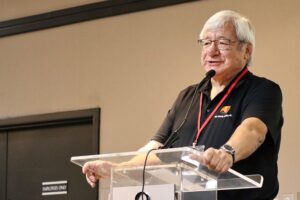Persevering with economic development objectives key to success

By Rick Garrick
SAULT STE. MARIE — Five Nations Energy Inc. CEO Pat Chilton stressed the importance of persevering with economic development objectives on the second day of the inaugural annual Anishinabek Nation Economic Development Opportunities Forum 2023. Chilton highlighted how the three James Bay First Nations of Fort Albany, Kashechewan, and Attawapiskat persevered with their concept of building a transmission line on the James Bay coast to get rid of diesel-operated generators in the communities even though the federal and provincial governments and Ontario Hydro said it was not possible during his keynote at the Forum, which was held by the Anishinabek Nation Economic Development Department from Oct. 24-26 at the Quattro Hotel and Conference Centre in Sault Ste. Marie.
“Thirty-seven times we were told, ‘It can’t be done’, ‘You’re not going to do it’ — but we kept going. Eventually, we got the financing in place, we had the engineers, we talked to a lot of lenders, we talked to Indian Affairs,” Chilton says. “Indian Affairs came on side eventually. We went through what they called the avoided cost funding model, that’s basically identifying what the cost would be for the next 25 years to operate those diesels in those communities and transport [fuel] and that type of thing. We weighed them against the environmental damage the diesels were doing in our communities, so they finally came on board and they gave the money that fronted the whole thing.”
Chilton says Fort Albany and Kashechewan were connected to the provincial power grid in 2001 by the Five Nations Energy power line, and Attawapiskat was connected in 2002.
“It was quite a feat actually just doing that, there were a lot of naysayers,” Chilton says, noting that one woman stood up in a community meeting about the power line and told the men to leave so the women could talk. “An hour and 20 minutes later, they came out and said: ‘You’re going to build that line, it’s for the best for everybody. Then we can power up, we can do whatever we want with electricity, no more diesel, no more noise, no more pollution.’”
Chilton says they set up independent power authorities in the three communities to manage the power lines within the community.
“My (Five Nations Energy) board wants to make sure that our message gets out to encourage First Nations to be part of the energy industry to make things work for them,” Chilton says.
Chilton says one of the challenges they have to deal with is climate change and how it impacts the power line.
“We had one pole where the frost is coming out and pushed the pole up, and then it started to lean,” Chilton says. “There’s erosion problems, flooding problems.”
Chilton says they took over the former DeBeers Victor Diamond Mine power line that connected the mine to the provincial power grid near Fraserdale, which now provides them with a twin line to the provincial power grid.
“The good thing about twinning that line is that we had redundancy,” Chilton says. “We used to worry about if a pole went down or if there is some sort of major issue, our communities would lose power. The good thing about this is if we shut off one line, the other line is operational and everybody has power. Any power outages there on the coast for Five Nations Energy are measured basically in minutes, not hours, sometimes seconds.”
Chilton adds that the DeBeers power line includes a fibre-optic line up to Attawapiskat, which enables them to track outages and to provide fibre-optic services to the communities.
“It works out pretty good, fibre right to the homes, it helps with the healthcare system,” Chilton says, noting that they can provide tele-ophthalmology, tele-mammography, and other services through the fibre-optic line. “We even went so far as, and we helped with this, purchasing a portable MRI, the only one of its kind in Canada right now.”
The Forum also featured keynote presentations by Mike Jacobs, co-chair at Canadian Council for Aboriginal Business and CEO at Cambium Indigenous Professional Services, and Dawn Madahbee Leach, general manager at Waubetek Business Development Corporation and chair at the National Indigenous Economic Development Board, as well as Joint Venture, Funding EcDev, and Business Development panels; EcDev Foundations, Resource Development and Economic Opportunities in Energy presentations; Energy and Resource Roundtables; and Networking and Tradeshow plenaries.


